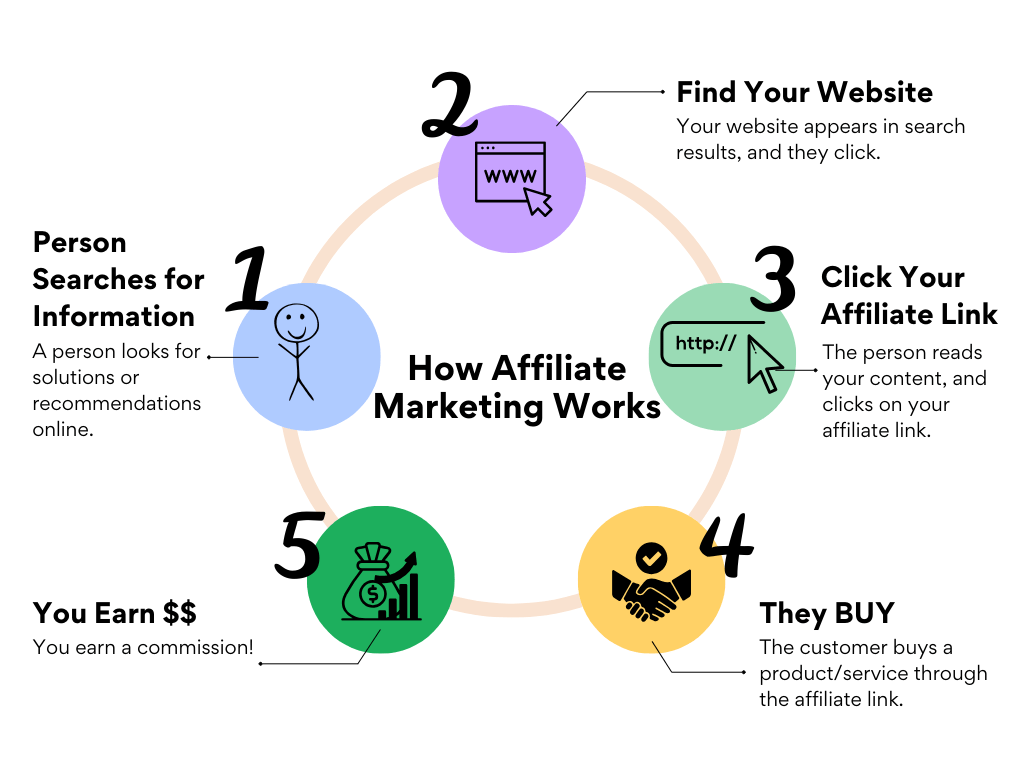Affiliate marketing has become one of the most popular ways to earn money online, offering an accessible way to build a steady income stream. When I first started exploring this space, I quickly realized that success depends on more than just adding affiliate links—it requires strategy, consistency, and patience.
If you’re new to affiliate marketing, the good news is that you don’t need to be an expert to start. With the right approach, you can build a business that grows over time. This guide will walk you through everything from choosing a niche and finding the best affiliate programs to advanced strategies for scaling your efforts.
Let’s start by breaking down how affiliate marketing works and what you need to know before diving in.
Understanding Affiliate Marketing
Affiliate marketing is a performance-based approach where you earn a commission by promoting other people’s products. Basically, you suggest products on your website or social channels, and when someone makes a purchase through your link, you earn a share of the sale. I was surprised by how accessible this method is. All you need is a website, blog, or even a social media account where you can reach potential buyers.
The concept isn’t complicated. It involves choosing a niche, finding affiliate programs, promoting products, and earning income from sales. However, success in affiliate marketing is not an overnight phenomenon. It involves research, persistence, and learning from mistakes along the way. In this guide, I will walk through each step to help you get started on the right foot.
Essential Strategies for Affiliate Marketing Success
Getting the fundamentals right is very important. Just as drone photographers need quality equipment, affiliate marketers require effective strategies and tools. Choosing the right niche is a good starting point. You need to select a topic that you’re passionate about and that has a decent market demand. Passion drives better content creation and persistence, which are both key to success.
There are several strategies you can use to improve your affiliate marketing results:
- Choose the Right Niche: Focus on a niche where you have some knowledge or passion, and where there is an audience interested in purchasing related products.
- Research Affiliate Programs: Look for programs that offer competitive commissions, reliable tracking, and are known for supporting their affiliates. Some programs even provide training and resources to help you get started.
- Create Quality Content: Content is king in affiliate marketing. Writing informative blog posts, engaging reviews, and helpful guides can attract potential buyers.
- Focus on SEO: Optimizing your content for search engines helps bring in organic traffic. This is a long-term strategy but can be very effective when done correctly.
Each of these strategies builds a foundation for affiliate success. Matching your methods with your strengths not only makes the work enjoyable but also improves your chances of earning a steady income.
Getting Started with Affiliate Marketing
Beginning your adventure in affiliate marketing might seem overwhelming at first. I remember feeling uncertain about how to start, but breaking the process into manageable steps made it easier.
This visual gives a clear, step-by-step overview of affiliate marketing, helping you see the big picture before diving into the details.

Now, let’s break it down into actionable steps:
- Build Your Platform: Decide whether you’ll use a blog, website, or social media account as your base. Many beginners start with blogging since it provides ample space to share detailed reviews and insights.
- Select a Niche: Choose a field that interests you and has market demand. This could be anything from technology to home improvement or even lifestyle products.
- Join Reputable Affiliate Programs: Look into programs that offer not just commissions but also support in the form of training, marketing materials, and regular updates on product offers.
- Create Compelling Content: Once your platform is ready, focus on creating clear and useful content. Write in a conversational tone, like chatting with a friend, which can help your audience connect with you.
- Use Your Affiliate Links Naturally: Always integrate your affiliate links in relevant parts of your content. I often mention helpful tools or resources and include my affiliate link where it makes sense. Check out My Wealthy Affiliate Review to learn more about the platform and get additional tips to refine your affiliate strategy.
Starting with these steps not only helps you structure your efforts but also sets a professional tone from the very beginning. Remember, consistency is key. As you gradually build your content library, your audience and credibility will grow as well.
Common Challenges in Affiliate Marketing
Even with a strong foundation, affiliate marketing comes with challenges. Let’s explore common roadblocks and how to overcome them.
- Finding the Right Audience – Your success depends on engaging with the right people. If your content isn’t reaching potential buyers, conversions will be low. Using SEO, social media, and email marketing can help attract a targeted audience. Tools like Google Analytics and social media insights allow you to track audience behavior and refine your strategy.
- Keeping Up with Industry Changes – The affiliate marketing landscape is constantly evolving—what worked last year may not be as effective today. Regularly updating your knowledge through newsletters, short courses, and networking with other marketers can help you stay ahead.
- Managing Competition – Many people enter affiliate marketing, making it a crowded space. However, success comes from offering genuine value and unique content rather than following trends blindly. Developing a unique voice and sharing honest, experience-driven insights will help you stand out.
- Tracking Performance Metrics – Understanding clicks, conversions, and revenue trends allows you to fine-tune your approach. Many beginners struggle with this, but learning to analyze data will help optimize strategies for better results.
By proactively addressing these hurdles, you’ll be able to adapt, improve, and build a sustainable affiliate marketing business.
Advanced Tips and Tricks for Affiliates
Once you’ve mastered the fundamentals, it’s time to refine your approach. These proven strategies can increase conversions and help you scale your affiliate marketing business.
- Optimize Your Content for Conversions: Instead of just focusing on traffic, concentrate on turning clicks into sales. This means creating content that guides your readers to take action, with clear call-to-actions and honest reviews of the products you promote.
- Take Advantage of Email Marketing: Building an email list is a smart move for any affiliate. Email marketing allows for a personal connection with your audience and can drive repeat visits and sales over time.
- Use A/B Testing: Experiment with different headlines, call-to-actions, and content formats to see what resonates best with your audience. Even small tweaks can lead to improved conversion rates.
Must-Have Tools for Affiliate Marketers
- Website Builders: Platforms like WordPress, Wix, or Squarespace offer great flexibility and ease of use.
- Keyword Research Tools: SEMrush or Ahrefs can help you find trending topics in your niche.
- Email Marketing Services: MailChimp or ConvertKit help manage newsletters and track engagement.
- Analytics Platforms: Google Analytics helps track visitor behavior and measure success.
By integrating these tools into your workflow, you can optimize your content, track performance, and maximize your earnings.
Frequently Asked Questions
Here are some questions many new affiliate marketers ask:
Question: Can I do affiliate marketing without a website?
Answer: Yes, you can promote affiliate products using social media, YouTube, or email marketing. However, having a website provides long-term stability, better SEO opportunities, and a central hub for your content.
Question: How long does it take to see results?
Answer: The timeline varies by individual and effort. Some people might see their first commissions within a few months, but for most, it takes consistent work over a longer period before significant income flows in.
Question: Do I need to invest a lot of money to start?
Answer: Not really. Many tools are affordable or free, especially for beginners. The main investment is time and effort to create quality content and attract an audience.
Question: How can I track my affiliate performance?
Answer: Use analytics tools like Google Analytics. Many affiliate programs also provide performance dashboards that show clicks, conversions, and total revenue.
Question: Are there restrictions on where I can place affiliate links?
Answer: Yes, different affiliate programs have rules about where links can be used. Some restrict links in paid ads, emails, or social media. Always check the program’s guidelines before sharing.
Question: What are the biggest mistakes new affiliate marketers make?
Answer: Some common mistakes include picking the wrong niche, promoting too many products at once, neglecting SEO, and not tracking performance data. Avoiding these pitfalls will help you build a more sustainable business.
Additional Insights and Tips
To take your affiliate marketing efforts even further, it’s important to stay adaptable and continuously refine your strategies. The digital landscape evolves, and keeping up with trends ensures your content remains relevant.
One way to do this is by exploring different content formats. Video tutorials, podcasts, and live Q&A sessions help expand your reach beyond written posts. Experimenting with new formats keeps your audience engaged and creates multiple touchpoints for driving conversions.
Networking with fellow affiliate marketers can also provide fresh insights. Engaging in online communities, participating in forums, and collaborating with others in your niche can open doors to new strategies and growth opportunities. These connections can help you refine your approach and stay motivated.
Another key element is tracking your progress. Reviewing analytics regularly helps identify what’s working and where improvements are needed. Small adjustments—whether tweaking a call-to-action or improving your SEO strategy—can lead to significant gains over time.
Affiliate marketing isn’t just about following a formula; it’s about learning, adapting, and making strategic choices. As you refine your methods and continue building your expertise, this business model can evolve from a side hustle into a steady income stream.
Wrapping It All Together
Success in affiliate marketing is built on understanding the niche, consistent effort, and smart use of available tools. I believe that clear strategies combined with continuous learning and adaptation are the backbone of success in this competitive field. Whether you are just testing the waters or aiming to scale your efforts, the steps and techniques shared here should help guide you.
Affiliate marketing might seem like a crowded space. However, with the right approach, you can carve out your own niche and generate a steady income. Every experienced affiliate marketer once started where you are now. Patience and perseverance will help you overcome early challenges and eventually reap the rewards.
Before you take your next step in this field, I encourage you to explore additional resources. For an insider look at the system that has worked for me, check out My Wealthy Affiliate Review. This all-in-one platform covers everything from beginner basics to advanced tactics and might just be the push you need to accelerate your progress.
Take some time to experiment with the strategies mentioned, track your progress, and don’t get discouraged by early setbacks. Every effort you put in contributes to a stronger foundation for your affiliate marketing business. By being patient, learning continuously, and adapting to new trends, you can turn your passion for affiliate marketing into a profitable venture.
